When Memory Loss Isn't Dementia: How a Vitamin B12 Deficiency Turned the Tide - Dr Aniruddha More

Lapses in memory and periods of confusion are typically linked to age-related memory decline or neurodegenerative changes. However, you may be surprised to discover that these same indicators are caused by something entirely different and, moreover, could be reversible.
At times, the symptoms we interpret to reflect a degenerative condition may more accurately describe an underlying nutritional imbalance that has been subtly impaired brain function.
A compelling example was the case of a 44 year old rickshaw driver from Thane who developed profound forgetfulness and disorientation. In a span of a few months, he could not recollect daily chores, misplaced things, and could not recognize roads leading back home.
His family felt he was sinking into early-onset dementia. MRI scans confirmed their worst fear they revealed brain atrophy consistent with degenerative change. However, they were surprised again during the further evaluations.
The patient had a strict vegetarian diet and abstained from all dairy and animal products due to religious beliefs. The blood was then determined to have a significant deficiency of Vitamin B12, which was an important nutrient for healthy brain and nerve functioning.
This deficiency resulted in serious abnormalities in nerve transmission, which mimicked symptoms of dementia. Once diagnosed, he was put on Vitamin B12 injections, and within weeks, his memory started coming back along with his alertness.
He gradually regained his cognitive functions and returned to his routine life.
This case constitutes a stern reminder that not all types of memory loss are caused by an irreversible brain disease rather, many instances result simply and importantly from a deficiency quite easily corrected with the right medical intervention.
The body often gives subtle clues-fatigue, confusion, tingling sensations that shouldn't be ignored. Early recognition and management of them might make the difference between decline and recovery.
Basically, this story epitomizes that good nutrition is not just about diet it's actually the foundation of how our brain thinks, remembers, and functions. Paying attention to what the body whispers today can prevent it from screaming tomorrow.
Disclaimer: The views expressed in this article are of the author and not of Health Dialogues. The Editorial/Content team of Health Dialogues has not contributed to the writing/editing/packaging of this article.


